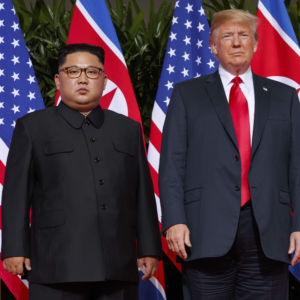SEOUL — The Pentagon has reluctantly followed the orders of President Donald Trump and canceled the next set of military exercises that U.S. and South Korean forces were to have staged jointly in August.
The Defense Department in Washington announced the decision simultaneously with South Korea’s ministry of national defense after a week of often tense discussions in which U.S. and Korean military people expressed their deep misgivings over what they regarded as a “political” decision.
The final decision came after both Americans and Koreans decided the cancellation applied only to the next exercises, Ulchi Freedom Guardian, scheduled every year in August. A Pentagon spokesman said the United States had refrained from any decision on two sets of war games played every winter and early spring, Key Resolve and Foal Eagle. Both of those exercises were staged this year after the Pyeongcheong Winter Olympics in February and then the Paralympics in March in which North Korea participated as the build-up to inter-Korean reconciliation.
The cancellation of Ulchi Freedom Guardian had grave implications for the defense of South Korea. “One time is not a big thing,” said Stephen Tharp, a retired U.S. Army officer with many years of experience focusing on North Korean issues. “It’s regrettable but not anything that will cause us to lose a war.”
Tharp warned, however, that permanent cancellation of joint exercises would definitely compromise the fighting skills of South Korean forces and Americans here to support them. He particularly worried about the effect on the ability of top commanders to be able to coordinate with one another.
“Eventually the skills are going to start degrading,” Tharp said. “Over time it will have a bigger effect.”
Cancellation of Ulchi Freedom Guardian was inevitable after Trump assured Kim Jong-un, in their summit in Singapore that the United States would call off war games while Kim gave assurances of “complete denuclearization.” Trump and Kim did not use the term “CVID,” for “complete, verifiable, irreversible denuclearization,” but Secretary of State Mike Pompeo, visiting Seoul and then Beijing, said the United States would indeed insist on CVID before relaxing sanctions imposed on North Korea after its nuclear and missile tests.
Trump in a tweet said that he was personally responsible for ending the war games. “Holding back the ‘war games’ during the negotiations was my request,” he said. “They are very expensive and set a bad light during a good-faith negotiation.” He echoed a term often used in North Korean rhetoric against the games, saying they were “provocative.”
The decision on war games coincided with a surprise visit to Beijing by Kim, who had visited the Chinese capital in March on his first trip outside North Korea since taking power after the death of his father, Kim Jong-il, in December 2011. Kim, his wife and younger sister were treated as royalty by China’s President Xi Jinping, who clearly wanted to assure him of his full support both economically and militarily, provided he at least gave an appearance of cooperation on denuclearization.
Kim again saw Xi in Dalian in May after having met South Korea’s president Moon Jae-in at Panmunjom on April 27. Again Kim and Xi deepened previously strained Chinese relations with North Korea before Kim met Moon for a second time at Panmunjom on May 26 and then flew to Singapore on an Air China 747 for his summit with Trump on June 12.
On his latest visit Kim is assumed to be persuading Xi of the need to lift sanctions imposed by the U.N. Security Council after its nuclear and long-range missile tests. North Korea last tested a nuclear warhead in September — a blast that is thought to have caused significant damage to the test site in a village named Pungg-rye. North Korea made a show of inviting U.S., South Korean and British TV journalists to destruction of the site, but it’s thought to have been largely torn apart by the last test that sent tremors through the region and killed an unknown number of people.
U.S. military sources insisted the United States and South Korea would stage next year’s war games if the North did not show serious signs of getting rid of its nukes. So far, however, Pyongyang’s state media have reported only respect for the statement signed by Trump and Kim in Singapore, while saying nothing about denuclearization.
South Korean negotiators have also called for North Korea to pull back the thousands of missiles and rocket launchers that threaten Seoul, but North Korea has not commented on that request. Trump and Kim did not discuss it in Singapore, while proclaiming the start of “a new era” in Korean history.
President Moon is determined, in the face of all signs that North Korea is doing little if anything to follow through on its promises, to continue efforts at reconciliation and dialogue. At a meeting of his national security council, he hailed “a new North Korea-U.S. relationship” as “the only way to completely denuclearize North Korea and bring peace to the Korean peninsula.”

